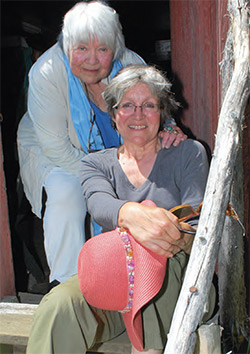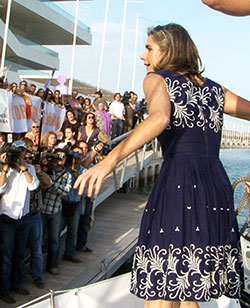Index - June, July, August, 2015 |
|
| Perennial Pleasures: A Garden of Delights in East Hardwick |
| by Kate Mueller |

Judith and Rachel Kane,
proprietors of Perennial Pleasures
Photo: Jan Doerler
|
Would you believe that an English teahouse, serving afternoon tea with scones on fine bone china, set amid three acres of perennial gardens, along with a greenhouse incubating rare heirloom botanicals, is located in the Northeast Kingdom?
Well, it’s true. East Hardwick is perhaps the somewhat improbable location of Perennial Pleasures Nursery—with the nursery, greenhouse, and gardens run by Rachel Kane and the teahouse, along with a gift shop, run by her mother, Judith Kane.
I had not heard of Perennial Pleasures until a month ago (and I am not unfamiliar with the Northeast Kingdom, having lived there as a teenager and spent much time there since), but the nursery has, in fact, been in continuous operation since 1980, when Rachel started the business at the family homestead: a beautiful 20-acre piece of property with a 1840s brick house, where Judith still lives.
Continue Reading...
|
|
| The Changing Image of Vermont’s Farmers |
| by Sarah Galbraith |

(top) Shirley Richardson has
transformed Vermont’s goat industry.
photo: Tristan Von Duntz
(below) Rachel Schattman of Bella Farm
photo: Patrick Rowe
|
The role of Vermont women in farming is changing. As recently as a generation ago, women for the most part assisted the farmer, usually a husband or father. But these days, they are increasingly in leadership positions, running their own farms and food businesses.
They are growing organic vegetables, producing humanely raised meat, and making their own award-winning cheeses, all while keeping the financial books in order, overseeing staff, marketing their products, setting up shop at weekend farmers’ markets, and fulfilling wholesale orders.
Nationally, the number of farms for which women make the day-to-day decisions as the principal operator rose from 5 percent in 1978 (the year the US Department of Agriculture first asked respondents to indicate gender on its Farm Census) to 11 percent in 2012, when the most recent census was completed.
FarmHer (www.farmher.com), a photographic project showing women in farming, says on its website, “Women have always been an important but mostly undocumented aspect of agriculture. In recent years, women are rising to the forefront of agriculture in so many ways; as owner/operators, landowners, workers, mentors and so many more.”
Continue Reading...
|
|
| Rokeby Museum: Historic Home of the Abolitionist Robinson Family |
| by Cyndy Bittinger |

Jane Williamson
Director of Rokeby Museum |
Rokeby Museum, designated a National Historic Landmark in 1997, is about 20 minutes from downtown Burlington, but a world away in terms of history and landscape. The bucolic setting for the museum in Ferrisburgh, VT, near the Lake Champlain ferry at Charlotte, takes you back in time to before the Civil War.
The longtime centerpiece of the museum is a 225-year-old historic house, formerly the home of the abolitionist Robinson family.
House and Grounds
The house, called Rokeby after a novel by Sir Walter Scott, was built in the 1780s by the Dakin family and added to in 1814 by Thomas R. Robinson. In 1792, the Robinson family moved from Rhode Island to Rokeby, and four generations of Robinsons occupied the house until 1961, when it became a museum.
The fully furnished home shows evidence of each generation, including artwork produced by many artistic family members. The most widely known one was Rachel Robinson Elmer (1878–1919), who settled in New York City and painted impressionist watercolor scenes on postcards in 1914 and art deco postcards from block prints in 1916.
Continue Reading...
|
|
| Women Dominate the 2015 Vermont Small Business Awards |
Each June the Small Business Administration (SBA) presents a variety of awards to entrepreneurs throughout the state. The SBA awards recognize small businesses for employment growth, financial success, company expansion, and community involvement.
Among the awards is Woman-Owned Business of the Year, which this year went to Amy Mattinat of Auto Craftsmen. But of the other six annual awards that SBA presents, five went to businesses owned and operated by women.
“It is very promising to see so many successful women making significant contributions to the economy,” said Darcy Carter, SBA Vermont District Office director. “They are an inspiration to young women and budding female entrepreneurs that they too can start and grow a profitable company in Vermont.”
According to the National Women’s Business Council, one in four companies in the US is owned or managed by a woman.
Continue Reading...
|
 2015 Small Business Person of the Year 2015 Small Business Person of the Year
Monica Greene
Vermont Precision Tools, Swanton
|
|
| Let the Sun Shine In: Community Solar Brings Solar Power to Everyone |
| by Sarah Galbraith |

Putney Community Solar Array panel owners
Photo: Courtesy of Clean Energy Collective |
The amount of solar energy hitting the earth’s surface in 40 minutes could provide power for the energy needs of the world’s population for one year. Let that sink in for a minute.
Now compare this to fossil fuels: all of our coal, oil, and natural gas combined equals 20 days of energy produced by the sun. In other words, in less than a month, the sun produces energy equivalent to all the earth’s fossil-fuel reserves. From a plain energy-in, energy-out point of view, solar power is a no-brainer.
Solar energy is also renewable. It’s continually available day after sunny—or cloudy—day. But the carbon-laden sources of fossil fuel renew themselves on a geologic scale that is imperceptible to us, rendering them nonrenewable in our lifetimes.
Continue Reading...
|
|
| Vessel: The Story of Rebecca Gomperts and the Abortion Ship |
| by Cyndy Bittinger |
 |
Rebecca Gomperts is a modern-day hero, similar to Margaret Sanger and Emma Goldman. In 2001, Gomperts, a physician, set sail with her team of Dutch pro-choice colleagues with the goal of bringing reproductive health services to women in countries where abortions are banned.
Diana Whitten, a documentary filmmaker, followed Gomperts on her journeys to provide abortions on the seas. The result of Whitten’s seven-year filming effort is the award-winning documentary Vessel, which was shown on April 26, 2015, at the White River Junction Independent Film Festival.
Before the screening of Vessel, Jane Pincus, of the Boston Women’s Health Book Collective, provided a historical context by showing Abortion, her film about two women getting abortions in the 1960s before it was legal. Pincus believed her film would educate people about the need for legalizing abortion at that time.
Continue Reading...
|
|





